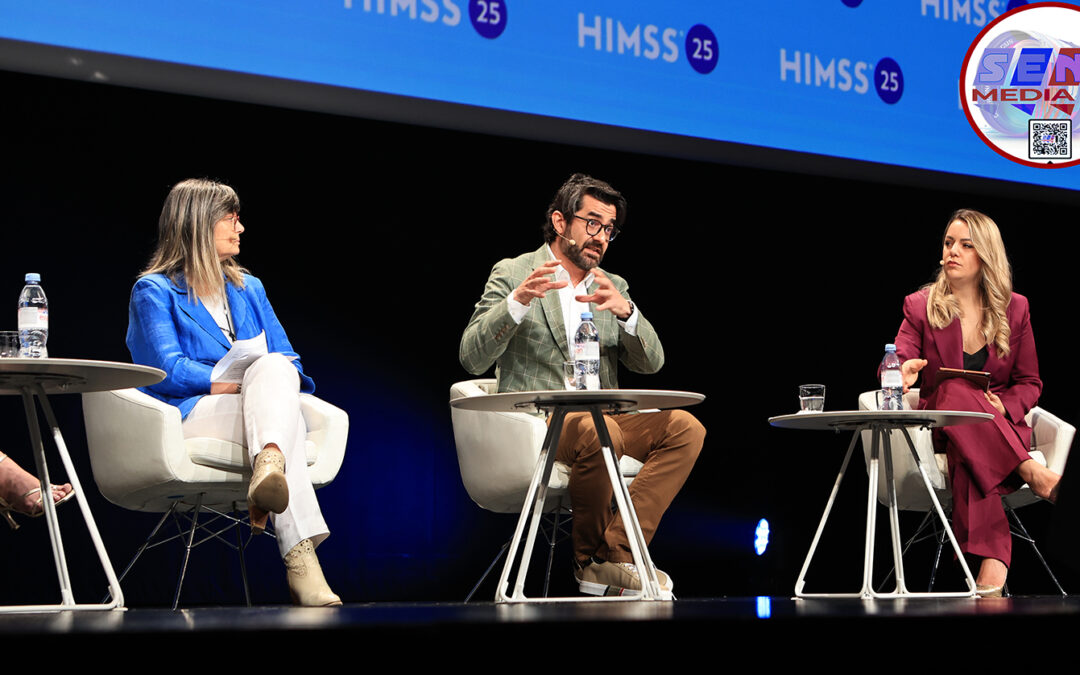Paris, France – June 11, 2025 – Leading voices in digital health policy from across Europe gathered on stage at HIMSS25 Europe for a high-profile fireside chat titled “Keeping Europe’s Future Bright”, spotlighting the continent’s bold vision for healthcare transformation. Senior representatives from the World Health Organization (WHO), the European Commission, and the Danish Ministry of Health discussed how the EU is aligning digital infrastructure, policy, and public trust to build the future of health.
Moderated by Gary Monk, Innovation Consultant, and Anca del Río, Digital Health Consultant at WHO, the panel featured:
- Dr. David Novillo Ortiz, Head of Data and Digital Health, WHO Europe
- Fulvia Raffaelli, Head of the Digital Health Unit, European Commission DG SANTE
- Dorte Bech Vizard, Deputy Permanent Secretary, Danish Ministry of the Interior and Health
The conversation centered on the European Health Data Space (EHDS), the AI Act, and strategies for empowering citizens through equitable, secure, and interoperable digital health systems.
Denmark Prioritizes Clinical Trials and Cybersecurity
Representing Denmark’s current EU Council presidency, Dorte Bech Vizard outlined key priorities. “Europe must reconnect with its position of strength in life sciences,” she said. “We are using our presidency to initiate a political conversation around increasing the uptake of clinical trials and reinforcing cybersecurity and supply chain transparency across member states.”
Denmark is also known for its high levels of public trust in digital systems. “You can’t copy trust—you have to earn it,” said Vizard. “Digital tools must deliver value to patients, protect their data, and remain fully transparent. It’s fragile and must be constantly nurtured.”
EU Frameworks Set to Transform Patient Experience
Fulvia Raffaelli emphasized the sweeping potential of the new EHDS regulation. “We are providing citizens the right to access their health records—anywhere in the EU, instantly and free of charge,” she said. “You’ll be able to carry your medical history digitally, control who accesses it, and support research through anonymized data.”
She noted that these developments will make seamless digital health access as natural as today’s mobile roaming. “By 2035, I hope no one has to think about the EHDS anymore—it’ll just work.”
The EHDS, together with the recently passed AI Act, offers a legal and technical foundation to ensure AI is deployed ethically and transparently in healthcare.
WHO: Bridging Data Gaps and Building Global Cooperation
Dr. David Novillo Ortiz of WHO Europe acknowledged the growing excitement around AI but warned of basic data deficits. “While we discuss AI, we must also address that 25% of health-related Sustainable Development Goals currently lack data. AI cannot replace what’s missing.”
To address this, WHO is building a regional AI roadmap based on a recent survey across 50 European countries, identifying key gaps in AI literacy, ethics, and governance. At the global level, the WHO is extending its Digital Health Strategy through 2027 and has begun drafting a new framework through 2033 that will embed AI readiness.
Novillo also highlighted the Strategic Partners Initiative, a WHO-led collaboration of over 115 institutions, including academia, NGOs, and private sector actors, aimed at aligning innovation with real-world public health needs. “We cannot isolate the private sector—but partnerships must be built on clear rules of engagement,” he said.
Reimagining the Citizen-Government Relationship
The panelists agreed that digital health—done right—has the power to redefine how governments and citizens interact. “We want patients to actively shape their care, not passively receive it,” said Vizard. “Digital health should lead to personalized services, reduced healthcare costs, and more accessible systems.”
This future, however, hinges on equity. “We must design digital systems that serve all populations equally,” she added.
A European Model for the World
Looking ahead, Novillo urged Europe to lead by example. “By 2050, one in three people will be over 60. One in four already experiences social isolation. We know the challenges—we just need to act,” he said.
He pointed to the success of the EU Digital COVID Certificate, now repurposed into the WHO’s Global Digital Health Certification Network, as a model for scalable, cooperative innovation.
“Europe has the infrastructure, the governance, and the people-first philosophy to lead,” he concluded. “Let’s make the future not just data-driven—but people-driven.”
Media Contact:
SEN 1 Media Communications
press@senonemedia.com
About HIMSS25 Europe:
HIMSS25 Europe is the premier event for digital health innovation, uniting health leaders, government policymakers, and technology providers to shape the future of health across the continent. Held at the Palais des Congrès in Paris, the 2025 edition focused on interoperability, trust, and the patient-centric transformation of care systems.

